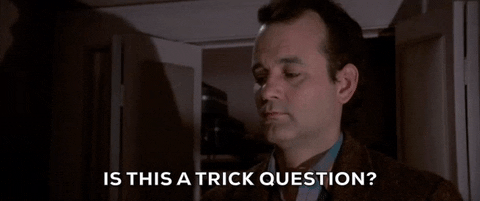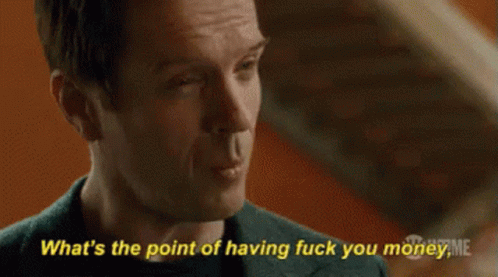True story:
One day, former-motorbike-racer Elias gets a phone call at his motorbike shop.
A major film production company is on the line.
They want to buy a bike.
But not just any bike. They want a rare, Italian, pedigree motorcycle for a famous actor to ride (and crash) in the movie they’re making. The bike they’re after is so rare, there’s only 7 left in the world.
“Elias, can you find us one?” the guy asks. “We’ll pay you ANYTHING. We have a movie budget.”
Now, at this point, Elias’ business was small. A $250k fee for finding one of these motorcycles was a LOT of money.
So it must’ve come as quite a shock when Elias replied:
“There’s 7 of these motorcycles left in the world. I’d never be involved - no matter how much money you offer - with destroying one.”

Boom.
Just like that, $250k down the drain.
… or was it?
His employees, his partners, and the rest of the industry soon heard about his decision…and Elias’ reputation went through the roof.
Here was a guy who stuck to his principles (his love of motorcycles) instead of selling out. Everyone wanted to work with him.
What happened next?
The $250k fee he lost turned into a mountain of business further down the line.
Compare that to the likes of BudLight, whose flip-flopping on their last year’s ad pissed off their existing customers AND the customers they were hoping to attract, losing $15.7 billion in the process.
Moral of the story?
People respect integrity.
Which makes integrity good for your career, too.
Today, I’m gonna unpack why.
1: 👩🏻💻 It’s a relationship game
Career success comes down to a couple of factors. Being good at what you do is one. But building relationships is just as important. It’s not about what you know, it’s about what you know + who you know.
So if you snake people and ‘burn bridges’, your reputation will pay the price, and very few people will want to work with you. Honesty pays in the long run.
Keep in mind, too, that trust and relationships take time to build…they’re built over years. But that’s where your biggest ‘career wins’ will come from. e.g. :
- A mentor you've known for years puts your name forward for a leadership role
- An old client brings you in to lead a high-profile project
- Your reputation lands you a coveted speaking slot at an industry conference
None of the great opportunities are things that’ll land in your lap from people you’ve just met. The best opps are built on years of compounded trust.
2: 🕵️♂️ People have long memories
I saw a Warren Buffett quote the other day (it actually inspired this write-up): “It takes 20 years to build a reputation and five minutes to ruin it.”

It takes just one selfish decision to tarnish your reputation for decades.
Think of the story of Enron. Prior to its bankruptcy, it was loved by Wall Street and was #1 on Fortune’s ‘Most Admired Companies’ survey. It’d built its reputation over 15 years.
One big accounting scandal later, their rep was flushed away and Enron is forever synonymous with the word ‘fraud’. And any exec who’d worked at Enron either went to jail or struggled to be hired.
This effect is just as real on a personal level. I mean, think about it... you’ll never work with or do favors for someone who:
- Threw you under the bus
- Took credit for your work
- Shared confidential info about you with others
The takeaway: We're wired to recall negatives more than positives. So, think twice before you do anything that might be perceived as negative. One moment of poor judgment can overshadow years of good work.
3: 🕵️♂️ The test isn’t the real test
I heard this story about the head of a software company.
He was hiring an engineer, and in the interviews, he asked all the candidates to reveal some private information about their previous company. (To do so would be very unethical, if not downright illegal.) If they refused, he’d ask again.

While most of the candidates gave something away, there was one guy who point-blank refused. And when he was asked again, he got up, told the boss where to put it, and stormed down the hallway.
The result? The boss chased after him, and immediately offered him the job. He knew he’d found his man.
Remember that story the next time a short-term carrot is dangled in front of you. Maybe it’s not a prize - it’s bait.
To quote Buffett again, “The three things we look for in a person are Intelligence, energy, and integrity. And if they don't have the last one, don't even bother with the first two.”
4: 🤝 Will I be able to sleep well at night?
In two stories I’ve told you, both Elias and the software engineer benefited financially for their integrity in the long run. But I don’t think the answer to “why should I have integrity?” is “because you’ll make more money.”
For me, what’s more important is being able to sleep at night with a clean conscience. So get clear on your values right from the get go.

5: 🕵️♂️ Loose lips sink careers
I'll be blunt here: gossiping or badmouthing colleagues is a surefire way to damage your professional reputation.
When you spread negativity, two things happen. First, you're immediately less trustworthy.
Secondly, the person you're talking about? If they find out – and they often do – you've burned that bridge for life(!). Even if you believe you're "just venting," keep the negative chatter out of the workplace.

This applies to job interviews too. Even when asked why you're leaving your current job, resist the urge to badmouth. I've seen candidates come across poorly by complaining about their boss or company culture. It makes you look bad, not them.
Even if your complaints are valid, airing them makes you seem like you lack ownership or hold grudges. No one wants to hire someone who might trash them later.
6. 🗽 Build your ‘F U’ network
What makes normal people do terrible things? Because if they kick up a fuss, they’d lose their livelihoods.
People often say, “save up some ‘F U’ money” so you can ‘quit’ if you don’t agree with what’s going on.
My variation of this is “build your ‘F U’ network”. Build relationships with people, hiring managers you speak to, or colleagues when they switch jobs. Stay in touch with people you value, and who value you. Having a strong network means having a ‘professional’ safety net.

Well, I hope those were helpful. I try to experiment with the topics I cover each week so you're able to look at your career from different perspectives, and you're more rounded as a result.


